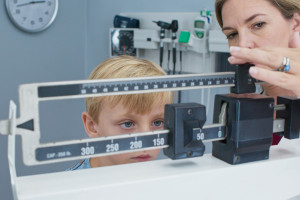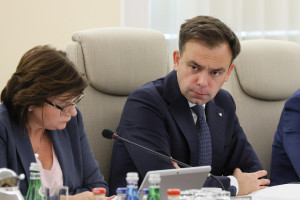The last moment for the bills that are to land on Andrzej Duda's desk

This evening (June 23 at 7 p.m.) the Sejm Health Committee will consider the report of the Standing Subcommittee on Mental Health on the parliamentary draft amendment to the Act on Patients' Rights and the Patient Rights Ombudsman and certain other acts. This act allows young people to use the help of a psychologist without the consent of their parents.
As Marta Golbik from KO, chairwoman of the subcommittee and also the Health Committee, tells Rynek Zdrowia, the applicants want Andrzej Duda to sign the bill. There is little time – the term of office of the incumbent president ends on August 6 and he will be replaced by Karol Nawrocki.
Meanwhile, the Sejm session that begins on Tuesday is the last in June, with two more planned for July (July 8-10 and 23-25) and one, one-day session in August (August 5). This is enough time to complete parliamentary work on the bill, provided that it proceeds relatively smoothly. And the same cannot be said about its progress so far: the bill was submitted to the Sejm in October last year, had its first reading in November, after which it was referred to a subcommittee. The subcommittee met on the bill only twice, and that was over half a year apart: on December 4 and June 12.
This is an important regulation, because it is a response to the demands of young people. The project was prepared in cooperation with young people and the children's rights advocate. It provides that a person of an age not yet entitled to consent to undergoing an examination or providing other health services (i.e. someone who has reached the age of 13 ) will be able to obtain the necessary help in the event of experiencing a mental crisis, also when it is not possible to obtain the consent of a parent (legal representative) for a consultation with a psychologist, psychotherapist or community therapist as part of guaranteed services (i.e. in the public health care system, "on the National Health Fund"). A person who has reached the age of 16 could also use such help when the legal representative does not initially consent to it.
During the work on the project, doubts were expressed about the constitutionality of this solution. The work in the subcommittee was to dispel them. The proposed amendment was therefore supplemented with clarifying provisions.
The Sejm Health Committee will also deal (on Tuesday, June 24 at 3 p.m.) with the draft amendment to the Public Health Act , concerning so-called energy drinks. The provisions amended in 2023 were intended to protect children from the negative effects of energy drinks, but the regulations prohibiting their sale are easy to challenge today, they were not notified again. This makes it impossible to conduct proceedings based on them, and the court dismisses those already initiated. The draft is of a technical nature, and its sole purpose is to carry out the notification of regulations - declare its authors.
Opposition to hospital privatizationDeputies from the Health Committee will also consider (also on Tuesday at 3 p.m.) the draft resolution proposed by PiS on the opposition to the privatization of the public health service.
Its authors express the belief that the actions of the current government are leading to this.
- The government's recent actions leave no illusions that the real intention is to privatize healthcare and take away the right to treatment from less affluent people who will not be able to afford treatments, surgeries or doctor visits - we read in the draft.
It emphasized that last year the government caused a deep crisis in the public health service. - The lack of financial resources for the implementation of overperformance resulted in numerous cancellations of procedures and surgeries, depriving many patients of access to necessary treatment. This crisis was particularly painful for the elderly, the chronically ill and residents of smaller towns - it was indicated in the draft resolution.
- Despite these difficult experiences, this year the government has reduced the amount of the health insurance contribution for entrepreneurs, in no way compensating for the gap that will appear in the health care budget. As a result of this decision, a gap in the budget has been created estimated at about PLN 6 billion - it added.
This is not correct, because the planned contribution reduction did not take place. President Duda vetoed the act that was to introduce changes next year that would reduce the National Health Fund budget by approximately PLN 6 billion. However, he made the decision at the beginning of May, and the draft resolution was submitted to the Sejm a month earlier. However, the reduction in the health insurance contribution adopted at the end of 2024 actually came into effect at the beginning of this year, but the cost of those changes is much lower – approximately half a billion zlotys.
However, there is too little money in the system – at the beginning of June, Minister Izabela Leszczyna admitted that another subsidy from the state budget for the National Health Fund would be necessary , but she has not yet applied for it.
- The lack of adequate financial resources already results in limited access to health services, and in the longer term it may lead to the actual liquidation of the universal and free health care system - emphasize the authors of the draft resolution.
On behalf of the Sejm, they want to call on the Council of Ministers to:
- Ensuring full financing of the healthcare system, in particular by filling the budget gap.
- Refrain from taking actions leading to the privatization of medical services and weakening the position of public health care facilities.
- Immediate filling of the gap in the health care budget from funds that are to be transferred to Telewizja Polska in liquidation and to the 800+ benefit for Ukrainian citizens who are not in an employment relationship in the territory of the Republic of Poland.
- Presenting a recovery plan for the public health service that will ensure its stability, efficiency and accessibility for all citizens, regardless of their financial situation.
Earlier (on Tuesday at 12:00), the committee will consider the report on the implementation of the state budget for the period from 1 January to 31 December 2024, together with the Analysis of the Supreme Audit Office in the scope concerning health care and units subordinate to the Ministry of Health.
Documents prepared by NIK have already been submitted to the Sejm. They show, among other things, that healthcare expenditures planned for last year amounted to 5.09% of GDP. This is less than the statutory indicator for this year, according to which these expenditures should amount to 6.2% of GDP.
- Despite the increase in the statutory indicator of minimum expenditure in this area (from 5.30% of gross domestic product in 2021, through 5.75% of gross domestic product in 2022 and 6.00% of gross domestic product in 2023, to 6.20% of gross domestic product in 2024), in the analysed period the ratio of planned expenditure on health care to gross domestic product forecasted for the same year for which expenditure is planned remained almost unchanged (5.12% in 2021 and 5.09% in 2022-2024), NIK reported.
In the Chamber’s opinion, this result means that, relative to the size of the economy, public spending on health care did not increase at all in these years.
However, according to the act, expenditures are calculated in relation to GDP from two years ago, i.e. taking into account the "t-2" principle. Economists have been pointing out for years that this is fiction, especially since the difference between expenditures calculated in relation to current GDP and calculated according to the "t-2" principle is increasing: from 0.4-0.5 to 1.6 percentage points. Łukasz Kozłowski, chief economist of the Federation of Polish Entrepreneurs, emphasizes that this difference has increased from an average of 11% to as much as 32.5% in 2022. As a result, in recent years the operation of the "7% GDP Act" has been only illusory.
Due to the slowing inflation, the difference between nominal GDP levels is starting to narrow again – in 2027 it is to fall to 12.8%. In practical terms, this means that the act will actually force higher spending on health.
Sławomir Dudek, chief economist at the Institute of Public Finance, points out that we actually exceeded the established limit in 2023 - we reached 7.1% of GDP. In 2024, it was slightly over 7% of GDP. In fact, we have been spending more than 7% of GDP on health for two years, although we are still using the path outlined in the act.
- However, with the stubbornness of a maniac, the levels from the act are assumed when planning the NHF budget, and in this way we have had a planning fiction for two years. A year ago, it was even boasted that we were planning record health expenditure for 2024 - PLN 190 billion (6.2% of GDP), while in 2023 they already amounted to 7.1% of GDP. So this actually means not an increase, but a decrease in relation to GDP - indicates the expert.
Copyrighted material - reprint rules are specified in the regulations .
rynekzdrowia












